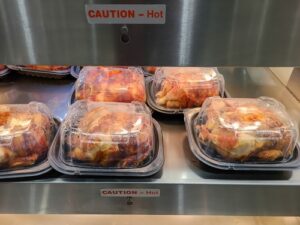
U.S. Reps. Andrew Garbarino (R-NY) and Brian Fitzpatrick (R-PA) seek to remove an outdated prohibition that prevents families from using federal food benefits to purchase hot foods, such as prepared rotisserie chickens, hot sandwiches, and soups.
Specifically, the lawmakers called on agricultural committee leaders in Congress to include their bipartisan, bicameral Hot Foods Act of 2023, H.R. 3519/S. 2258, in the 2024 Farm Bill to allow hot foods to be covered by the Supplemental Nutrition Assistance Program (SNAP), which currently serves 42 million Americans.
“Since its enactment 60 years ago, SNAP has prohibited the purchase of hot foods,” the lawmakers wrote in a Nov. 30 letter sent to agricultural committee leaders in both chambers. “While this restriction may have made sense in the 1970s, when most families were cooking their meals at home, it is no longer an accurate reflection of American families’ dietary or lifestyle needs.”
Rep. Garbarino and Rep. Fitzpatrick were joined by four of their colleagues in signing the letter, including U.S. Rep. Grace Meng (D-NY) and U.S. Sen. Michael Bennet (D-CO). Reps. Garbarino and Meng introduced H.R. 3519 on May 18. The bill currently has 100 cosponsors. Sen. Bennet and U.S. Sen. Alex Padilla (D-CA) introduced S. 2258 on July 12. The identical bills remain under committee consideration.
If enacted, their proposed measure would allow SNAP benefits for the purchase of hot foods or hot food products that are ready for immediate consumption, according to the text of the bill.
“During natural disasters, USDA’s Food and Nutrition Service grants waivers to affected counties so that SNAP participants can use their benefits to purchase hot foods when they are unable to prepare food at home,” wrote the lawmakers. “Such waivers demonstrate that the restriction on hot foods is an unnecessary red tape of business owners, program administrators, and American families.”
The lawmakers also pointed out that the hot foods prohibition means that SNAP customers may purchase cold or frozen items, “but if retailers prepare or heat the same food items, they become ineligible for purchase under the program.”
“Allowing the purchase of cold foods, but not their hot equivalents, disenfranchises vulnerable Americans who often rely on SNAP benefits for access to critical nutrition,” they wrote. “The Hot Foods Act has bipartisan support in Congress. Now is our opportunity to provide families the flexibility their lives demand and modernize SNAP with a simple fix.”
The letter has been endorsed by the Food Research and Action Center, GRACE, and the National Association of Convenience Stores.



